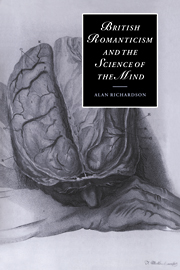Book contents
- Frontmatter
- Contents
- List of illustrations
- Preface
- List of abbreviations
- 1 Introduction: neural Romanticism
- 2 Coleridge and the new unconscious
- 3 A beating mind: Wordsworth's poetics and the “science of feelings”
- 4 Of heartache and head injury: minds, brains, and the subject of Persuasion
- 5 Keats and the glories of the brain
- 6 Embodied universalism, Romantic discourse, and the anthropological imagination
- 7 Epilogue
- Notes
- Bibliography
- Index
- CAMBRIDGE STUDIES IN ROMANTICISM
6 - Embodied universalism, Romantic discourse, and the anthropological imagination
Published online by Cambridge University Press: 22 September 2009
- Frontmatter
- Contents
- List of illustrations
- Preface
- List of abbreviations
- 1 Introduction: neural Romanticism
- 2 Coleridge and the new unconscious
- 3 A beating mind: Wordsworth's poetics and the “science of feelings”
- 4 Of heartache and head injury: minds, brains, and the subject of Persuasion
- 5 Keats and the glories of the brain
- 6 Embodied universalism, Romantic discourse, and the anthropological imagination
- 7 Epilogue
- Notes
- Bibliography
- Index
- CAMBRIDGE STUDIES IN ROMANTICISM
Summary
“We have all one human heart,” Keats declares (IL 2:80). Keats has been speculating on the “instinctiveness” that the “noble animal Man” shares with his fellow creatures in the same rambling, brilliant journal-letter that records his unforgettable meeting with Coleridge and that culminates in his inscription of the “Ode to Psyche.” Characteristically, Keats's figure for a core human nature is a corporeal one, evoking (especially in its context) the nervous, passionate, “ellectric” model of human subjectivity that his poetry shares with the radical brain science he absorbed at Guy's Hospital. Yet this deeply Keatsian phrase is in fact a quotation from Wordsworth, the “more than materialist” Wordsworth of Lyrical Ballads who speaks, in its controversial “Preface,” of the “primary laws of our nature” and of the “great and universal passions of men” (WP 1: 122, 144). Wordsworth returns to this position later in describing an organic and embodied poetic sensibility – “grounded” in “universal intellectual” capacities and the “sensations which all men have felt” – that accounts for the poet's expression of universal “truths,” “instinctively ejaculated” in moments of “intuition” (WP 2: 78). This embodied, emotive universalism is put most simply in the line Keats quotes (slightly misremembering it) from “The Old Cumberland Beggar,” a lyrical ballad striving to represent human nature in its barest essentials: “We have all of us one human heart.”
- Type
- Chapter
- Information
- British Romanticism and the Science of the Mind , pp. 151 - 180Publisher: Cambridge University PressPrint publication year: 2001



